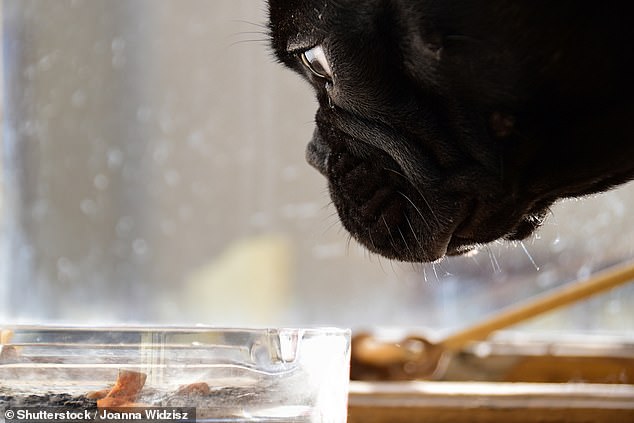Are you killing your pets with secondhand smoke? Dogs in homes full of fumes are SIX times more likely to develop cancer, scientists have warned
- Previous studies show that smoking causes at least 15 different types of cancer in humans
- Research shows that smoke exposure also increases the risk of cancer in dogs
<!–
<!–
<!– <!–
<!–
<!–
<!–
If you're a smoker, you may have set yourself the ambitious New Year's resolution to finally kick the habit.
And now a new study will give you even more motivation to ditch cigarettes.
Researchers from Purdue University have warned that dogs in smoke-filled homes are up to six times more likely to develop cancer.
“If pet owners can reduce their dogs' exposure to smoking, this could benefit the dogs' health,” said Professor Deborah Knapp, lead author of the study.
'We hope they stop smoking completely, both for their health and for their dogs, but any steps to keep the smoke out of the dogs will help.'

Researchers from Purdue University have warned that dogs in smoke-filled homes are up to six times more likely to develop cancer (stock image)
Previous studies have shown that smoking causes at least 15 different types of cancer in humans.
However, until now, the effect of passive smoking on animals has been largely underexposed.
In their new study, the team wanted to investigate whether cigarette smoke also increases the risk of cancer in dogs.
The researchers examined 120 Scottish terriers, a breed known to develop bladder cancer twenty times more often than other breeds.
'We know that the genetics of Scotties play a big role in making them vulnerable to cancer,' Professor Knapp said.
'If we were to do this study with mixed breeds of dogs, it would take hundreds and hundreds of dogs to uncover the same risk, which is probably present, just harder to distinguish because those dogs are not already genetically predisposed to developing bladder cancer. .'
The dogs were followed for a period of three years, during which time their health, environment, food, activity and locations were monitored.
An analysis of the results found that dogs exposed to cigarette smoke were six times more likely to develop bladder cancer than dogs that were not.


When a dog is exposed to secondhand smoke, his body absorbs the chemicals and eliminates them through the urine, which can lead to cancer in the urinary tract (stock image)
When a dog is exposed to secondhand smoke, his body absorbs the chemicals and eliminates them through the urine, which can lead to cancer in the urinary tract.
And this doesn't just happen through breathing; the dogs can also absorb these chemicals by licking clothing that is soaked with the odor.
“If someone goes to a smoky concert or party, then comes home and the dog jumps on his or her lap to snuggle, the dog could be exposed to the particles in the smoke through the person's clothing,” says Professor Knapp .
The researchers emphasize that the results are not black and white.
Just like humans, not all dogs that were around second-hand smoke got cancer, while some dogs that weren't around smoke still got cancer.
However, they hope the findings will encourage smokers to either quit smoking or smoke away from the dog and change clothes before cuddling their dog.
